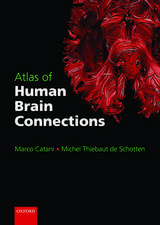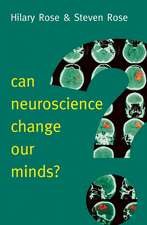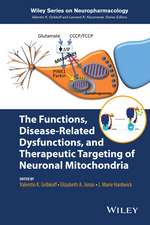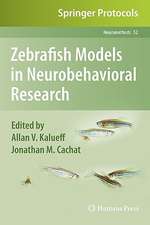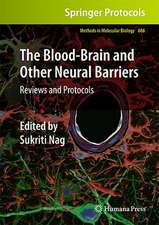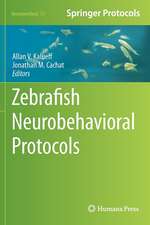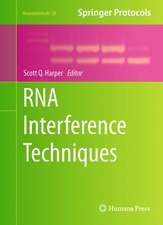The Orexin/Hypocretin System: Physiology and Pathophysiology: Contemporary Clinical Neuroscience
Editat de Seiji Nishino, Takeshi Sakuraien Limba Engleză Hardback – 15 aug 2005
| Toate formatele și edițiile | Preț | Express |
|---|---|---|
| Paperback (1) | 1057.40 lei 38-44 zile | |
| Humana Press Inc. – 9 dec 2010 | 1057.40 lei 38-44 zile | |
| Hardback (1) | 1239.19 lei 6-8 săpt. | |
| Humana Press Inc. – 15 aug 2005 | 1239.19 lei 6-8 săpt. |
Din seria Contemporary Clinical Neuroscience
- 5%
 Preț: 655.43 lei
Preț: 655.43 lei - 18%
 Preț: 958.25 lei
Preț: 958.25 lei - 18%
 Preț: 1678.01 lei
Preț: 1678.01 lei - 18%
 Preț: 1403.22 lei
Preț: 1403.22 lei - 18%
 Preț: 1008.43 lei
Preț: 1008.43 lei - 5%
 Preț: 1407.87 lei
Preț: 1407.87 lei - 18%
 Preț: 1101.40 lei
Preț: 1101.40 lei - 18%
 Preț: 944.19 lei
Preț: 944.19 lei - 18%
 Preț: 1231.01 lei
Preț: 1231.01 lei - 5%
 Preț: 1105.95 lei
Preț: 1105.95 lei - 15%
 Preț: 644.30 lei
Preț: 644.30 lei - 5%
 Preț: 1173.82 lei
Preț: 1173.82 lei - 15%
 Preț: 641.03 lei
Preț: 641.03 lei - 18%
 Preț: 1229.40 lei
Preț: 1229.40 lei - 18%
 Preț: 1110.24 lei
Preț: 1110.24 lei - 18%
 Preț: 1113.39 lei
Preț: 1113.39 lei - 18%
 Preț: 1225.94 lei
Preț: 1225.94 lei - 5%
 Preț: 1438.58 lei
Preț: 1438.58 lei - 15%
 Preț: 651.84 lei
Preț: 651.84 lei - 5%
 Preț: 1103.22 lei
Preț: 1103.22 lei - 18%
 Preț: 1402.55 lei
Preț: 1402.55 lei - 5%
 Preț: 1089.48 lei
Preț: 1089.48 lei - 18%
 Preț: 1828.60 lei
Preț: 1828.60 lei - 5%
 Preț: 1103.75 lei
Preț: 1103.75 lei - 18%
 Preț: 1407.46 lei
Preț: 1407.46 lei - 18%
 Preț: 951.47 lei
Preț: 951.47 lei - 18%
 Preț: 1385.37 lei
Preț: 1385.37 lei
Preț: 1239.19 lei
Preț vechi: 1511.20 lei
-18% Nou
Puncte Express: 1859
Preț estimativ în valută:
237.15€ • 257.51$ • 199.20£
237.15€ • 257.51$ • 199.20£
Carte tipărită la comandă
Livrare economică 22 aprilie-06 mai
Preluare comenzi: 021 569.72.76
Specificații
ISBN-13: 9781588294449
ISBN-10: 1588294447
Pagini: 412
Ilustrații: 416 p. 151 illus., 9 illus. in color.
Dimensiuni: 178 x 254 x 31 mm
Greutate: 1.06 kg
Ediția:2005
Editura: Humana Press Inc.
Colecția Humana
Seria Contemporary Clinical Neuroscience
Locul publicării:Totowa, NJ, United States
ISBN-10: 1588294447
Pagini: 412
Ilustrații: 416 p. 151 illus., 9 illus. in color.
Dimensiuni: 178 x 254 x 31 mm
Greutate: 1.06 kg
Ediția:2005
Editura: Humana Press Inc.
Colecția Humana
Seria Contemporary Clinical Neuroscience
Locul publicării:Totowa, NJ, United States
Public țintă
Professional/practitionerCuprins
History.- History and Overview of Orexin/Hypocretin Research.- Overview of the Orexin/Hypocretin Neuronal System.- Orexin and Orexin Receptors.- Orexin Projections and Localization of Orexin Receptors.- Neuronal Responses to Hypocretin/Orexin.- Afferent System of Orexin Neurons.- Assessment of Orexin/Hypocretin Functions in Tissue and Biological Fluids.- Hypocretin Measurements in the CSF, and Blood and Brain Tissue.- Hypocretin Receptor-Activated G Proteins Revealed by [35S]GTP?S Autoradiography.- Physiology.- Orexin System and Feeding Behavior.- Orexins and the Autonomic Nervous System.- Neuroendocrine Role of the Orexins (Hypocretins).- The Orexin/Hypocretin System and Stress and Emotion.- Physiology.- Hypocretin as a Wakefulness Regulatory Peptide.- Hypocretin/Orexin Tonus and Vigilance Control.- Hypocretin System and Aminergic and Cholinergic Systems in the Control of Vigilance.- Orexin and Hypothalamic Control of Sleep and Waking.- Hypocretin/Orexin and Motor Function.- Pathophysiology: Narcolepsy and Orexin/Hypocretin Deficiency.- Overview of Human Narcolepsy.- Canine Models of Narcolepsy.- Rodent Models of Human Narcolepsy-Cataplexy.- Pathophysiology: Narcolepsy and Orexin/Hypocretin Deficiency.- Hypocretin Deficiency in Human Narcolepsy.- Hypocretin Status in Neurological Disorders in Relation to Excessive Sleepiness and Cataplexy.- Hypocretin Measures in Psychiatric Disorders.- Neuroendocrinology of Human Narcolepsy.- Narcolepsy and Autoimmunity.- Pathophysiology: Narcolepsy and Orexin/Hypocretin Deficiency.- Pharmacology of Hypocretin/Orexin Peptides and Small Molecules.- Rescue of Narcoleptic Orexin Neuron-Ablated Mice by Ectopic Overexpression of Orexin Peptides.- Hypocretin/Orexin Replacement Therapy in Hypocretin/Orexin-Deficient Narcolepsy.
Textul de pe ultima copertă
Impairment of orexin/hypocretin signaling causes narcolepsy-cataplexy in animals and humans. Most human narcolepsy-cataplexy cases are associated with orexin/hypocretin ligand deficiency, which can be detected clinically using cerebrospinal orexin/hypocretin measures and may lead to future treatments with orexin/hypocretin replacement therapy. In The Orexin/Hypocretin System: Physiology and Pathophysiology, leading researchers and clinicians review these exciting developments to set the stage for further research on the loss of orexin/hypocretin neurons in humans, regulation of sleep and wakefulness by the orexin/hypocretin system, and the role of the orexin/hypocretin system in many other physiological processes, including feeding, autonomic regulation, and neuroendocrine regulation. Topics of interest include an assessment of the functions and the physiology of orexin/hypocretin, its pathophysiology in human narcolepsy-cataplexy, and possible pharmacological treatments. The authors also introduce several experimental methods for orexin/hypocretin research, and, using multidisciplinary approaches, explain their uses and limitations.
Authoritative and state-of-the-art, The Orexin/Hypocretin System: Physiology and Pathophysiology will aid scientists in the search for novel bioactive peptides and their receptors, as well as novel physiological insights and opportunities for the clinical treatment of not only narcolepsy, but also a broad range of diseases associated with endocrine, feeding, and body weight regulation.
Authoritative and state-of-the-art, The Orexin/Hypocretin System: Physiology and Pathophysiology will aid scientists in the search for novel bioactive peptides and their receptors, as well as novel physiological insights and opportunities for the clinical treatment of not only narcolepsy, but also a broad range of diseases associated with endocrine, feeding, and body weight regulation.
Caracteristici
Includes supplementary material: sn.pub/extras





